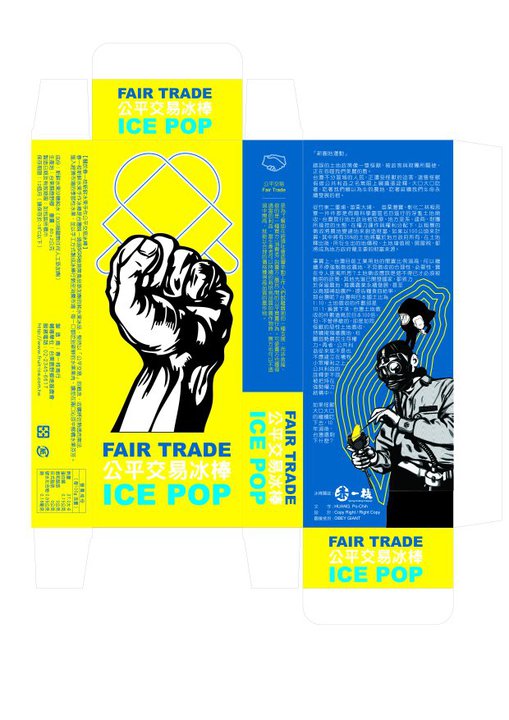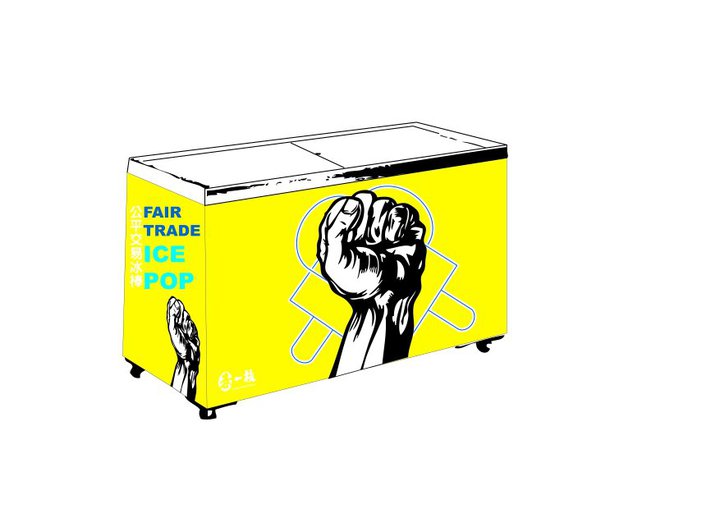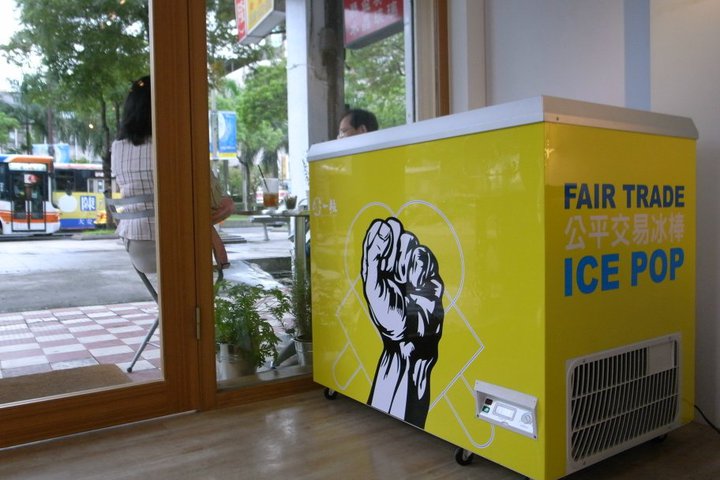公平交易冰棒
2010
尺寸依展出空間而異
海報、紙盒、冰棒、冷凍櫃、PVC
在今年炎炎夏天簽訂的「兩岸經濟合作架構協議」(ECFA),雖然中國未要求台灣進一步開放大陸農產品進口,但在「後ECFA時代」下,技術、人員、資金、勞務、商品等的自由流動,也流失許多品種、品牌。同時,低價的中國貨品,或台商轉移到中國設廠製造的商品,反而靠著「低價優勢」傾銷回台。
台灣自2002年加入WTO後造成的離農潮,休耕面積更是逐年增加,2000年農發條例修正通過以後,農地種起別墅;2010年產創條例通過以後,農地餵飽財團,廣開土地徵收大門。被粗糙審議通過的農再條例計畫用十年的時間,投入一千五百億的特別預算,來進行所謂的「農村再生」,我們看到的是一條條對於農村景觀的拉皮工程,卻不見真正符合農民利益、維護農村永續的法案。
我們真正需要的是健全的產銷體系制度和提高糧食自給率,以面對未來種種產業衝擊,但現在錯誤的土地政策像一隻怪獸,正在吞噬我們美麗的島,農業與農村景觀漸漸消失,大部分人卻渾然不知,10年過後,台灣還剩下什麼?
公平交易冰棒 與目前致力於推廣台灣有機農產及公平交易的「春一枝公司」進行合作,透過水果製成冰棒的生產、消費、蒸發過程,反應台灣農村面臨的消失危機。冰棒包裝上的圖像和文字,則說明政府制定的各項錯誤政策對台灣農業所造成的衝擊,如台灣品牌技術的流失、中國農產品的低價傾消回台、非法圈地農地消失、產銷體系的缺乏、糧食自給率偏低等。
公平交易冰棒試著以公平交易為替代性經濟模式,在強勢資本體系標準化的獨佔式系統外,透過與位置相對邊緣化的生產者及農民的合作,維持自主產銷的可能性,並且希望成為消費社會中,一種傳遞資訊的工具。(文/黃博志)
黃博志
生於1980年,目前居住與工作於台灣台北
展覽選錄
2009 「秘密花園」,雀而喜美術館,紐約,美國
「軟抗爭」,VT Artsalon,台北,台灣
2008 「2007第11屆日本文化廳媒體藝術祭」,國立新美術館,東京,日本
「半影:台灣當代藝術展」,南澳大學美術館,澳洲
「08上海藝術博覽會國際當代藝術展—驚喜的發現」,上海展覽中心,上海,中國
2007 「假動作2」,華山文化園區,台北,台灣
2006 「慢」,台北當代藝術館,台北,台灣
「neMaF 2006 第六屆首爾新媒體藝術節」,首爾,韓國「404 第三屆國際電子藝術節」,羅沙略,阿根廷
2005 「五行.五形—台灣當代常民劇場」,高雄市立美術館,高雄,台灣
Fair Trade Ice Pop
2010
Dimensions variable
Poster, carton, ice pop, freezer, PVC
In the Cross-Straits Economic Cooperation Framework Agreement (ECFA)signed into effect in the middle of this year’s long hot summer, the People’s Republic of China did not require Taiwan to further open up its markets to agricultural products from the PRC. However, but in the free-flow of technology, human resources, finances, labor, and products in the post-ECFA economy, name brands along with the variety of products available will be diluted as lower valued Chinese products, and products manufactured by Taiwanese corporations in their Chinese factories, are re-imported into Taiwan, with a cost advantage.
Moreover the aftermath of Taiwan joining the World Trade Organization (WTO), farmers began to abandon their fields. This trend has continued ever since. The Agricultural Redevelopment Policy was revised in 2000, but it only encouraged the rise of a new crop of mansions to spring up on fallow farm land. Subsequent to the the passage of the Production Innovation Ordinance in 2010, Taiwan’s farmlands were now able to satisfy the bellies of business consortia and land developers. The Farmland Re-Utilization Ordinance that was passed after rough review, outlines plans to inject 1.5 billion NT dollars into the “regeneration of the farm villages.” What has been seen is a superficial face-lift of bucolic scenery, rather than any specific and substantial benefits that will truly help farmers or sustain our agricultural industries.
What is really needed now is a comprehensive production and delivery system and a self-sustaining food production rate in order to bolster the future impact on Taiwanese industries. But these current faulty land policies are like a mutated monster, swallowing up our beautiful island. Our farms and farm villages have quietly vanished without causing any alarm. A decade from now, what will be left of Taiwan?
Fair Trade Ice Pop was produced in co-orperation with the Spring Trading Company, who is currently promoting Taiwan’s organic farming industry and fair trade. Through the process of using natural fruit to produce ice lollies, the trading and the eventual consuming of this product are a response to the crisis of Taiwanese farms becoming extinct.
The images and text printed on the packaging of the ice lollies describe the damaging effects on Taiwan’s agricultural industry through various harmful policies. For instance: the loss of Taiwan’s technological branding, the flooding of Taiwanese markets by lower-priced mainland Chinese goods, and the disappearing agricultural land, the insufficient production and delivery systems, the low rate of self-sustaining food production, etc.
The Fair Trade Ice Pop attempts to use fair trade as an economic model. Outside of a standardized dominant capitalist system of monopoly, and through cooperation with marginalized producers and farmers, these ice lollies hope to maintain a self-sustaining production and consumption model as well as become a message delivery tool in a consumer society. (Text by HUANG Po-chih. Translated by Yvonne Kennedy.)
HUANG Po-chih
b. 1980. Now lives and works in Taipei, Taiwan.
Selected Exhibitions
2009 Dream in a Contemporary Secret Garden, Chelsea Art Museum, New York, USA
SOFT Revolt, VT Artsalon, Taipei, Taiwan
2008 2007 the 11th Japan Media Arts Festival, National Art Center, Tokyo, Japan
Penumbra: Contemporary Art from Taiwan, Anne & Gordon Samstag Museum of Art, Australia
ShContemporary 08-Best of Discovery, Shanghai Exhibition Center, Shanghai, China
2007 FEIGNING MOVEMENT 2, Huashan Culture Park, Taipei, Taiwan
2006 SlowTech, Museum of Contemporary Art, Taipei, Taiwan
neMaF 2006 6th New Media Festival in Seoul, Seoul, Korea
III INTERNATIONAL FESTIVAL OF ELECTRONIC ART 404, Rosario, Argentina
2005 A Theater of Taiwanese Common Culture, Kaohsiung Museum of Fine Arts, Kaohsiung, Taiwan
<photo id=”4″ />



